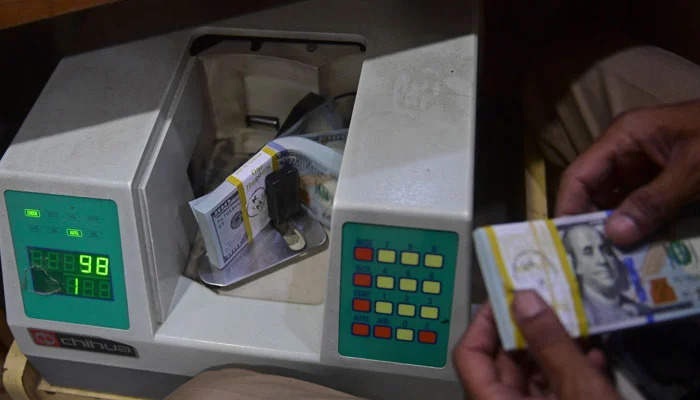The rupee on Friday plunged to a historic low against the dollar after Prime Minister Shehbaz Sharif’s said that the International Monetary Fund (IMF) is giving Pakistan “a tough time” — as the lender wants the government to do more on the economic front.
“As we speak, an IMF delegation is in Islamabad [holding parleys on loan programme] and giving a very tough time to the finance minister and his team,” the prime minister said while speaking at the Apex committee meeting in Peshawar, and termed the economic challenges “unimaginable”.
Following the PM’s comments, the local currency depreciated further against the greenback in the interbank market.
During intra-day trade, the rupee was changing hands at 279 against the dollar at 12:48pm, according to the Exchange Companies Association of Pakistan (ECAP), up from Rs271.35 a day earlier.
Analysts have stressed that the country needs the Washington-based lender’s bailout programme to avoid default — a threat that has been looming over Islamabad for some months now.
AA Commodities Director Adnan Agar told Geo.tv that the rupee’s downward spiral is expected till Pakistan secures a staff-level agreement with the Washington-based lender.
The analyst said that the market is reacting to the reports coming on the demands being put forward by the IMF to the government.
Agar warned that if the government fails to secure a staff-level agreement with the Fund, then the rupee will incur further losses.
“If the IMF deal is done timely then it would appreciate but not that much,” said Agar.
In a bid to curb the black market and meet IMF demands, the government and exchange companies removed the dollar cap — imposed to stabilise the dollar’s value.
But that did not have a substantial effect on the local currency as the investors remain wary due to a surge in terrorism and the decline in State Bank of Pakistan-held foreign exchange reserves — which now stand at just $3.08 billion and will provide an import cover of 18.5 days.
ECAP General Secretary Zafar Paracha told Geo.tv that when the dollar cap was removed, it was estimated that the rupee would hit 270 and rebound, however, circumstances changed.
“Our reserves are at their lowest in nine years and terrorism — which isn’t restricted to Peshawar — is also surging,” he said, explaining the reason behind investors’ lack of confidence in the government.
The ECAP general secretary added that the ongoing political turmoil was also adding to the country’s woes as opponents are being arrested every other day and being put behind bars.
Paracha added that the black market gap has been met to a certain extent, but since the government has not opened the letters of credit (LCs) for importers, it will persist.
“The government has asked the importers to arrange dollars on their own […] this is why the black market is still active. If this does not stop, the gap might even increase,” he warned, urging the authorities to move towards import rationalisation.
Paracha added that amid the terror threat and other underlying reasons, the exports have not released their payments yet, resulting in the scarcity of dollars in the market.
Pakistan-IMF talks
A day earlier the IMF rejected the government’s circular debt management plan.
And today it was reported that the Fund has conveyed to the authorities to undertake substantial qualitative and sustainable tax and non-tax revenue measures to fetch additional revenues for filling the projected gap of Rs600 billion in the fiscal framework.
The IMF delegation has asked the government to jack up the Federal Board of Revenue’s (FBR) tax collection target to align it with the projected nominal growth in the current fiscal year mainly with the help of a surge in the CPI-based inflationary pressures.
The Fund seems ready for providing an adjuster on flood expenditures once the fiscal framework is finalised. But it will depend on how much expenditures could be occurred on floods both on the development and non-development side of the budget especially through disbursements of stipends through the Benazir Income Support Programme (BISP).

 Business2 days ago
Business2 days ago
 Latest News2 days ago
Latest News2 days ago
 Latest News2 days ago
Latest News2 days ago
 Business2 days ago
Business2 days ago
 Latest News2 days ago
Latest News2 days ago
 Latest News2 days ago
Latest News2 days ago
 Entertainment2 days ago
Entertainment2 days ago
 Latest News2 days ago
Latest News2 days ago





















